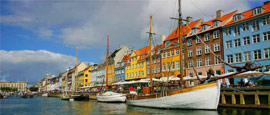Travel to Copenhagen
Flying to Copenhagen
Scandinavian Airlines, SAS, flies to Copenhagen from major global destinations. Flights are usually cheaper in winter (December to February except during the period between Christmas and New Year).
From the UK, British Airways, easyJet, Norwegian and SAS fly direct to Copenhagen.
From London - 1 hour 45 minutes; New York - 7 hours 35 minutes; Sydney - 24 hours (including stopovers).
Website:https://www.cph.dk/en
Location:
Copenhagen Airport is located 8km (5 miles) southeast of Copenhagen.
Money:
ATMs are located in all terminals. Banks are located in Terminal 2. Money exchange offices are in Terminal 3.
Luggage:
Contact the information desk in the arrivals hall for lost luggage or lost property. The airport holds most items for a maximum of 72 hours only. Copenhagen Airport also offers an online lost property form at cph.force.com.
Travel by road
Traffic drives on the right-hand side. Drivers must keep their headlights switched on at all times, including during the day. Every car must also have a red warning triangle in case of an accident or breakdown. An International Driving Permit is not required but may be preferable if your national driving licence is not in English.
The legal driving age in Denmark is 17 with supervision.
The speed limits are as follows:
• Highways 68 mph (110 kmh) to 80 mph (130 kmh)
• Main roads 49 mph (80 kmh) to 55 mph (90 kmh)
• Built-up areas 24 mph (40 kmh) to 31mph (50 kmh)
Dansk Autohjælp A/S (tel: +45 7010 8090).
Denmark has a well-developed road network with Highway E20 crosses the country from west to east. Ring 2 surrounds the most central part of Copenhagen and it is connected to major highways like E47 and E20.
From Stockholm - 7 hours; Hamburg - 5 hours.
Eurolines Scandinavia (www.eurolines.de/en/home/) operates bus services with connections to many European destinations, including Amsterdam, Berlin, Frankfurt, Oslo, Paris, Stockholm and Vienna.
Travel by rail
Sticking to all the Scandinavian clichés, the rail service in Denmark is clean, slick and reliable. In Copenhagen, all international and urban S-trains arrive and depart from Københavns Hovedbanegård (Copenhagen Central Station), which is located on Bernstorffsgade near Tivoli Gardens.
Danish State Railways (DSB) (www.dsb.dk) operates punctual, clean and well-equipped trains. Direct trains run from Copenhagen to various European destinations, including Stockholm and Hamburg. Some routes require seat reservations, so check before you travel.
InterCity trains offer a direct connection between Copenhagen and other major Danish centres, such as Odense, Aarhus and Esbjerg.
From Stockholm - 5 hours; Hamburg - 5 hours 30 minutes.
Travel over water
The port of Copenhagen, aka Copenhagen Malmö Port (CMP), offers three cruise terminals in Copenhagen: Nordre Toldbod, Langelinie Pier and Ocean Quay (Oceankaj).
Most cruise ships going to Norwegian Fjords and Russia make a call at Copenhagen.
DFDS (www.dfds.com/en) runs an overnight ferry service from Oslo (Norway) to Copenhagen with daily sailings in both directions.
Bus number 27 runs from Ocean Quay (Oceankaj) to Østerport Station, a suburban and Metro train station in Copenhagen and from there, it is an easy bus or train journey to the city centre or you can walk (30 minutes). In the summer months when the number of cruise passengers soars, bus 25 also serves this route. Alternatively, take a hop-on/hop-off bus which will take you to the city centre and major sights.
Bus number 26 runs from Langelinie Pier to the city centre every 20 minutes. You can also walk from Langelinje Pier to Østerport Station in 15 minutes or to the city centre in 30 minutes.
From Nordre Toldbod, you can walk to Østerport Station in 15 minutes or to the city centre in 30 minutes.
Do you have any Feedback about this page?
© 2026 Columbus Travel Media Ltd. All rights reserved. No part of this site may be reproduced without our written permission, click here for information on Columbus Content Solutions.








 You know where
You know where